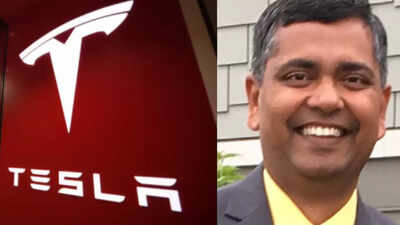In the fast-paced realm of automotive AI, Ganesh Venkataramanan, ex-lead of Tesla’s Dojo supercomputer, has launched DensityAI, a groundbreaking startup set to transform how self-driving car AI systems are developed and deployed. Backed by a team of 20 senior Tesla Dojo engineers, DensityAI focuses on creating a bespoke full-stack AI platform tailored specifically to meet the intense computational and data demands of autonomous vehicles. By combining advanced hardware and software innovation, DensityAI aims to streamline AI training and deployment for automakers, positioning itself as a pivotal player in the future of autonomous driving technology.
Former Tesla’s Dojo Ganesh Venkataramanan builds DensityAI to revolutionise AI technology
Ganesh Venkataramanan’s journey began with Tesla, where he spent seven years leading the development of Dojo, Tesla’s proprietary AI supercomputer engineered to train neural networks using vast amounts of driving data. His background in chip design, sharpened during his tenure at AMD, now fuels his mission at DensityAI to deliver an end-to-end AI platform tailor-made for the automotive sector.
Unlike generic AI solutions, DensityAI focuses on the unique challenges faced by carmakers — notably the enormous computational power and data handling required for autonomous driving, sensor fusion, simulation, and edge computing. The startup’s platform aims to eliminate the need for automakers to build expensive and complex AI infrastructure in-house, positioning itself as a plug-and-play solution for the industry.
DensityAI focuses on automotive AI challenges with plans to expand into robotics
Self-driving vehicles generate and process colossal volumes of data from cameras, lidars, radars, and other sensors. The computational muscle needed to make sense of this data in real time is immense, often demanding data centers as powerful and intricate as the vehicles themselves.Currently, Nvidia holds a dominant position in the automotive AI chip market. However, DensityAI seeks to carve out its own niche by concentrating on automotive-specific AI hardware and software needs, rather than applying a broad, one-size-fits-all approach. Reports indicate DensityAI is already engaged in talks with car manufacturers and preparing for a significant funding round valued in the hundreds of millions. While cars are DensityAI’s primary focus, its ambitions extend further. The company plans to target other industries reliant on real-time AI processing, including robotics and any sector that benefits from scalable data center infrastructure designed for fast, efficient AI computation.
Tesla AI team changes reveal safety challenges in driverless car
Venkataramanan’s exit from Tesla follows a trend of high-profile departures from the company’s AI division. In 2023, Andrej Karpathy, Tesla’s former AI director, returned to OpenAI, and others have launched startups or raised concerns about the complexities and safety challenges in achieving full vehicle autonomy.Despite this, Tesla continues to push forward, reportedly collaborating with Samsung on next-generation AI chips. Meanwhile, startups like DensityAI benefit from the influx of top-tier talent looking to specialize in solving specific automotive AI problems — signaling a shift in the competitive landscape. Developing AI systems for self-driving cars is not merely an engineering challenge — it is also a regulatory and safety challenge. Automakers face intense scrutiny over safety, testing protocols, and deployment standards, making reliability and trustworthiness paramount.Industry experts emphasise that success in this market requires more than innovation; it demands scalable, reliable, and compliant AI solutions that can safely integrate with real-world driving conditions. DensityAI’s founders bring a unique advantage here: their experience in creating one of the world’s most sophisticated AI training platforms.
DensityAI targets faster, smarter AI training and deployment for automakers
Observers have described DensityAI as a “full-stack AI data center company”, highlighting its comprehensive strategy that combines custom hardware design with advanced software tools. This integration offers automakers a streamlined solution for training, deploying, and maintaining autonomous driving AI systems — potentially transforming the way AI data processing is handled in the automotive sector.The company’s first products are expected to launch soon, targeting improvements in AI training speed, deployment efficiency, and overall cost-effectiveness. Success here could redefine the industry’s approach to AI infrastructure. With a team that has already built record-breaking AI systems, DensityAI is betting it can replicate that success and accelerate the future of safe, intelligent autonomous driving. By offering tailored AI infrastructure designed specifically for automotive needs, DensityAI could help car manufacturers overcome current bottlenecks and speed up the rollout of next-generation self-driving technologies.Also Read | Intel CEO Lip-Bu Tan to meet Donald Trump in White House amid US-China semiconductor security tensions: Report

